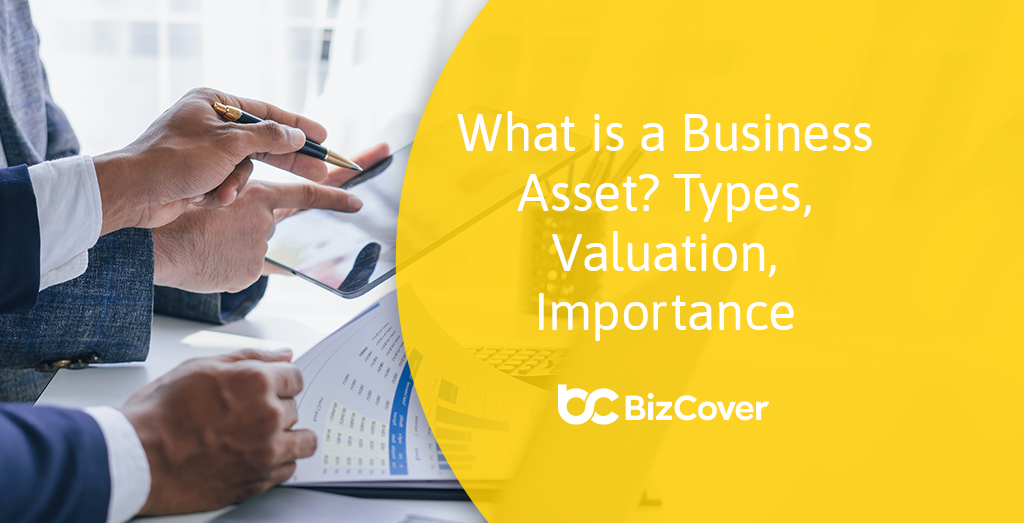Published on: September 19, 2023
6 min read
What are business assets? Types, properties, valuation, importance
In any business, there are certain things that hold value and contribute to its progress. These are known as business assets.
But what exactly qualifies as a business asset, and why is it important for business owners to recognize them? In this article, you’ll discover not just what qualifies as a business asset, but also how crucial they are in painting a complete picture of a business’s worth.
What is a business asset?
A business asset is any item of value that your company rightfully owns. This includes both tangible items like machinery and intangible items like intellectual property. These assets provide operational support and contribute to your company’s overall valuation.
Personal vs business assets
It can often happen that the lines between personal and business assets get blurred, especially for small business owners or sole traders. But you have to be able to maintain a clear distinction between these two categories for accounting, tax, and liability reasons. Personal assets belong to the individual, and often hold emotional or sentimental value. On the other hand, business assets are tools that fuel a business’s performance and profitability.
Personal assets are the items and valuables that are intrinsically yours. That cherished book collection, your weekend getaway cabin, or the family heirlooms passed down through generations. They’re tied to your personal life and have no official role in your business’s operations.
Business assets are the resources and items that play a role in your business’s operations and growth. This includes the storefront that attracts clients, the patented product design, or the loyal customer base you’ve built over the years. Business assets drive value to your business and are central to its functions.
Assets vs liabilities
Assets are everything your business owns that hold value. These can range from tangible items, like property and machinery, to intangible ones, such as patents or brand recognition. They represent potential future benefits to the company.
Liabilities, on the other hand, are the financial obligations or debts your business needs to settle down the line. This could mean the money you owe to suppliers, taxes you need to pay, or wages for your employees. While assets can become less valuable over time (like a car losing value as it gets older), liabilities stay the same until you settle them.
Monitoring both assets and liabilities offers an accurate snapshot of your company’s financial health and helps in making informed decisions.
Types of business assets
Business assets play an invaluable role in defining a company’s net worth and operational capacity. They represent the potential future earnings of a business and impact how efficiently a company can operate and grow.
1. Current assets
Current assets are the lifeblood of day-to-day business operations. They are resources that can be readily used up or cashed in within a year.
Examples of current business assets are:
- Cash
- Accounts receivable
- Marketable securities
- Inventory
2. Non-current assets
Non-current assets are long-term investments. Their full value might not be realized within a single fiscal year, but they provide consistent value and support to a company’s operations and growth.
Examples of non-current business assets are:
- Property
- Machinery
- Intellectual property
3. Tangible assets
Tangible assets are likely what most people picture when thinking of business assets – physical items that have measurable worth. Tangible assets are touchable, seeable, and often, wearable or operable. They can depreciate over time, and can be damaged or lost.
Examples of tangible business assets are:
- Vehicles
- Stock or inventory
- Equipment
4. Intangible assets
Intangible assets are the unseen forces propelling a business forward. They represent the non-material assets that give businesses a competitive edge, legal rights, or distinct recognition in the market.
Examples of intangible business assets are:
- Trademarks
- Licences
- Copyrights
- Patents
- Reputation or brand
Properties of a business asset
To qualify as a business asset, an item should meet the following:
Ownership
For an item or resource to count as a business asset, the business have to have clear ownership or control. It’s not just about having it in your possession but about legal ownership. If another party can swoop in and stake a claim, you might want to re-evaluate its position on your balance sheet.
Economic value
Your business assets, tangible or intangible, have to carry a monetary weight. It’s not merely about the price tag but about its potential to be sold or used to further your business goals. If it’s contributing to your bottom line, it’s a business asset.
Resource potential
Think of this as the asset’s future promise. Every business asset should have the potential to contribute to future economic value. It could be the software that propels your daily tasks, a tool that crafts your unique services, or a license that opens doors for revenue.
What is asset valuation?
Asset valuation is the method of determining the true worth of a business’s possessions. Think of it as putting a price tag on everything, whether it’s tangible like the office coffee machine, or intangible like the company’s brand reputation. Placing a concrete value on these assets helps businesses can strategise, leverage, and make informed decisions.
The importance of accurate asset valuation
Valuing your business assets accurately is a necessary step in determining your company’s financial stability. The right valuation informs you of the current financial health of your business. Furthermore, it shines a light on the path forward, allowing you to take the next steps with confidence.
Accurately valuing your business assets influences not just your balance sheet – it shapes your insurance coverage. Overvaluing assets? You’ll overspend on premiums. Undervaluing? You risk insufficient coverage, leaving your business exposed. Simply put, correct asset valuation ensures your business stays financially healthy and protected against unforeseen mishaps.
Protect your business assets with BizCover
The strength of your business lies in its business assets. But understanding their worth is only half the story, the next steps is making sure they’re protected with the right business insurance. With BizCover, experience a seamless process that lets you compare business insurance quotes instantly and make an informed decision without any drama or delay. Call BizCover at 1300 920 868 or visit our website to enjoy a better insurance experience today.
© 2023 BizCover Pty Limited, all rights reserved. ABN 68 127 707 975; AFSL 501769
This information is general only and does not take into account your objectives, financial situation or needs. It should not be relied upon as advice. As with any insurance, cover will be subject to the terms, conditions and exclusions contained in the policy wording or Product Disclosure Statement (available on our website). Please consider whether the advice is suitable for you before proceeding with any purchase. Target Market Determination document is also available (as applicable). © 2025 BizCover Pty Limited, all rights reserved. ABN 68 127 707 975; AFSL 501769.



